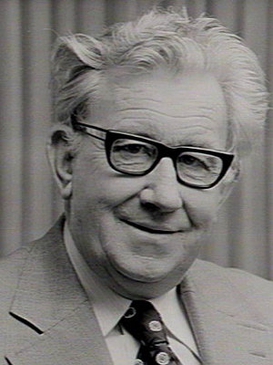
Barrie John Unsworth is an Australian former politician, representing the Labor Party in the Parliament of New South Wales from 1978 to 1991. He served as the 36th Premier from July 1986 to March 1988. Since the death of Steele Hall on 10 June 2024, Unsworth is the oldest living premier of an Australian state.

Neville Kenneth Wran, was an Australian politician who was the Premier of New South Wales from 1976 to 1986. He was the national president of the Australian Labor Party (ALP) from 1980 to 1986 and chairman of both the Lionel Murphy Foundation and the Commonwealth Scientific and Industrial Research Organisation (CSIRO) from 1986 to 1991.
Members of the New South Wales Legislative Assembly who served in the 48th parliament held their seats from 1984 to 1988. They were elected at the 1984 state election, and at by-elections. The Speaker was Laurie Kelly.

Laurie John Ferguson was an Australian politician and member of the New South Wales Legislative Assembly for the Australian Labor Party. He served in Neville Wran's state government as the Deputy Premier of New South Wales from 1976 to 1984.

Elections to the 49th Parliament of New South Wales were held on Saturday 19 March 1988. All seats in the Legislative Assembly and a third of the seats in the Legislative Council were up for election. The Labor government of Premier Barrie Unsworth was defeated by the Liberal-National Coalition, led by Opposition Leader Nick Greiner in a landslide victory against Labor.
Members of the New South Wales Legislative Assembly who served in the 46th parliament held their seats from 1978 to 1981. They were elected at the 1978 election, and at by-elections. The Speaker was Laurie Kelly.

Kenneth George Booth was a New South Wales politician, Treasurer, and Minister of the Crown in the cabinets of Neville Wran and Barrie Unsworth. From 1981 to 1988 he was the Treasurer of New South Wales. He was a member of the New South Wales Legislative Assembly for 28 years from 8 October 1960 until his death on 1 November 1988 for the Labor Party, representing the seats of Kurri Kurri and Wallsend.
Clarence Joseph Earl was an Australian politician and a member of the New South Wales Legislative Assembly from 1953 until 1973. He was a member of the Labor Party (ALP).
The Askin–Cutler ministry (1973) or Fifth Askin ministry was the 66th ministry of the government of New South Wales, and was led by the 32nd Premier, Sir Robert Askin, of the Liberal Party in coalition with the Country Party, led by Sir Charles Cutler. It was the fifth of six occasions when Askin was Premier and when Cutler was Deputy Premier.
The Askin–Cutler ministry (1973–1975) or Sixth Askin ministry was the 67th ministry of the government of New South Wales, and was led by the 32nd Premier, Sir Robert Askin, of the Liberal Party in coalition with the Country Party, led by Sir Charles Cutler. It was the sixth and final occasion when Askin was Premier; and when Cutler served as Deputy Premier to Askin.

The Wran ministry (1976–1978) or First Wran ministry was the 71st ministry of the New South Wales Government, and was led by the 35th Premier of New South Wales, Neville Wran, representing the Labor Party. It was the first of eight consecutive occasions when Wran was Premier.

The Wran ministry (1978–1980) or Second Wran ministry was the 72nd ministry of the New South Wales Government, and was led by the 35th Premier of New South Wales, Neville Wran, representing the Labor Party. It was the second of eight consecutive occasions when Wran was Premier.

The Wran ministry (1980–1981) or Third Wran ministry was the 73rd ministry of the New South Wales Government, and was led by the 35th Premier of New South Wales, Neville Wran, representing the Labor Party. It was the third of eight consecutive occasions when Wran was Premier.

The Wran ministry (1981–1983) or Fourth Wran ministry was the 74th ministry of the New South Wales Government, and was led by the 35th Premier of New South Wales, Neville Wran, representing the Labor Party. It was the fourth of eight consecutive occasions when Wran was Premier.

The Wran ministry (1983–1984) or Fifth Wran ministry was the 75th ministry of the New South Wales Government, and was led by the 35th Premier of New South Wales, Neville Wran, representing the Labor Party. It was the fifth of eight consecutive occasions when Wran was Premier.

The Wran ministry (1984–1986) or Seventh Wran ministry was the 77th ministry of the New South Wales Government, and was led by the 35th Premier of New South Wales, Neville Wran, representing the Labor Party. It was the seventh of eight consecutive occasions when Wran was Premier.

The Wran ministry (1986) or Eighth Wran ministry was the 78th ministry of the New South Wales Government, and was led by the 35th Premier of New South Wales, Neville Wran, representing the Labor Party. It was the eighth of eight consecutive and final occasions when Wran was Premier.

The Unsworth ministry was the 79th ministry of the New South Wales Government, and was led by the 36th Premier of New South Wales, Barrie Unsworth, representing the Labor Party.
A by-election was held for the New South Wales Legislative Assembly seat of Bass Hill on 2 August 1986. The by-election was triggered by the resignation of sitting Labor MP Neville Wran. It was won by Liberal candidate Michael Owen.
Bass Hill, an electoral district of the Legislative Assembly in the Australian state of New South Wales was created in 1962 and abolished in 1991.




